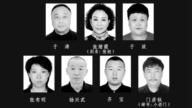【新唐人2013年09月04日讯】中共中纪委和监察部主办的综合性网站9月2号正式上线,网站宣称,可以接受民众对反腐工作的意见,并提供网民举报贪官的通道。当天,中纪委书记王岐山、副书记赵洪祝还亲自出马,到场做所谓的调研。不过,中纪委开通举报网站隐藏着什么机关呢?目的真的是反腐吗?我们来看观察人士的分析。
中纪委监察部网站介绍,网站作为中纪委、监察部信息公开、新闻发布、网路举报的主管道,将打造成所谓的宣传教育、网路监督等平台。
网站除了提供一些监察信息,如监察部电话、地址外,还提供了网民举报贪官的通道,包括“实名举报”与“匿名举报”。
深圳独立作家朱健国:“它是打着收集信息,收集舆论,收集民意的这么一步棋来控制,现在各部都在加强对民间舆情的监测和控制,这就是对舆情的监测和控制,它是这样一个目的,它并不是鼓励放开的、自由的监督。”
朱健国指出,中纪委并不是一个真正的反腐机构,它只是中共维护专制政权的工具。
大陆《权利运动》组织发起人胡军:“根本就不需要举报箱,因为整个网路媒体就是一个最大的反贪腐的信息平台,312这公开透明的多快,效应多好,他们为啥要单独设一个?原因就是它要有选择性的反贪。”
中共十八大后,在中共新领导人习近平和王岐山掀起的所谓反腐浪潮中,中国网路实名举报蔚然成风。去年11月,重庆不雅视频男主角雷政富的丑闻曝光,在网路发酵63个小时后,雷被免职,之后更有21名涉案淫官被免职。
中共原发改委副主任刘铁男,去年也被网路举报,今年5月他被控涉嫌严重违纪,8月初,刘铁男被双开。8月8号,被网路曝光集体嫖娼的4名上海法官,3人被撤职、1人被免职。
胡军:“本身中共体制就是一个腐败集团,应该反的是这个体制,把这个体制解体掉,是它做的一件真正的反腐的事情。如果抱着这个体制的话,那反腐只能是打击异已做秀,为了维护这个体制铲除异已,这是它们的目的。”
8月下旬,广州《新快报》记者刘虎被警方以“涉嫌寻衅滋事罪”刑拘。他曾经在微博上实名举报中共国家工商总局副局长马正其,陕西公安厅长杜航伟等,4名副部级官员贪腐,
朱健国:“中纪委的存在本身就是一个腐败,中纪委垄断了反腐的权力,法院、检察院都没权力第一时间去反腐,必须有中纪委交待了,它们才能支持,那么中纪委谁来监督它呢?没人监督它,它本身就是一个政治腐败的产物。”
事实上中纪委监察部网站开通之前,今年4月,《人民网》、《新华网》等中共喉舌网站也推出了所谓的网路举报监督专区,宣称希望网民举报各地官员违纪违法行为。7月1号,国家信访局也开放网上投诉受理内容,国家信访局局长还信誓旦旦的号称,认真办理网上信访诉求。
重庆市民韩良:“它已经茍延残喘了,它的政权马上就要垮台了,我们老百姓马上要爆发了,又来安慰我们说可以信访,要给我们解决问题,它还是欺骗我们,共产党一天不垮台,老百姓没有一天的好日子。”
韩良强调,中共当局开通这些所谓的举报网站,是想把民众的举报途径规范在它们可控制的范围内,但民众已经清醒了,不会上当,也不会去配合它们。
采访编辑/李韵 后制/李勇
Hidden Purpose of Wang Qishan Anti-Corruption Website
On September 2, the Central Commission for
Discipline Inspection (CCDI) and Supervision
Ministry jointly launched a new website.
The website provides a platform for
netizens to report corrupt officials.
On the same day, Wang Qishan, the head
of CCDI, along with his deputy Zhao Hongzhu,
visited the operators of the website.
What was the purpose of launching this website?
Can it really implement anti-corruption?
Let’s take a look at our commentators analysis.
The anti-corruption website states that it will be a
major channel to release news, interpret policies,
and receive online reports of improper behaviors.
The website provides inspected information, such as
a corruption hotline, address and channel to report corrupt
officials, either anonymously, or by using their real names.
Zhu Jianguo, Shenzhen independent writer: “They
claimed to collect information and public opinion.
However, in reality, they intend to intensify control
and monitor citizens, to restrain freedom of expression.
This is its purpose, and it isn’t to
encourage transparency and freedom.”
Zhu points out that the CCDI isn’t
an anti-corruption department.
It is a tool to maintain the Chinese
Communist Party’s (CCP) dictatorship.
Hu Jun, founder of Human Rights Campaign in China:
“It is unnecessary to set up an anti-corruption website.
The entire internet is the largest anti-corruption platform.
It is quick, efficient, and transparent,
so why do they still need a new one?
It is because they are selective in their fight of corruption.”
After the CCP 18th Congress, the new leader Xi Jinping
and Wang Qishan vowed to fight corruption.
Thus, by using real name online reports,
corrupt officials become a new fashion.
In November 2012, the Chongqing official
Lei Zhengfu’s sex tape scandal was exposed.
63 hours later, Lei was sacked, and
21 linked officials were dismissed.
Liu Tienan, a former top economic
official was reported online.
In May, Liu was suspected of grave violations of discipline.
In August, Liu was expelled from the party and his position.
On August 8, four Shanghai judges were exposed online.
It revealed they were hiring prostitutes. Later, three of
them were expelled from the party, and one was sacked.
Hu Jun: “The CCP system is corrupt, and
should be cracked down and collapsed.
This is real anti corruption by doing this.
To hold the CCP system, talking about
anti corruption is just an empty talk.
Their purpose is to remove
opponents, to maintain its regime.”
In late August, Liu Hu, a journalist of Guangzhou’s New
Express Daily was detained. on suspicion of causing trouble.
Liu reported on a microblog about senior official
Ma Zhengqi, Shan’anxi police chief Du Hangwei and
four other deputy ministry-level corruption officials.
Zhu Jianguo: “The CCDI is corrupt, now
they control the power of anti-corruption.
The Court and Procuratorate had no first rights
of anti-corruption, and they need CCDI’s order.
Then, they can act.”
Since the CCDI’s anti-corruption site opened,
the websties of state-owned media Renmin
and Xinhua had also launched similar columns.
They claimed that they hope netizens
report officials’ violation of discipline.
On July 1, the State Council correspondence
department opened an online reporting site.
They claimed to be dealing seriously with letters and appeals.
Han Liang, Chongqing citizen: “The CCP
struggles for survival, and will soon collapse.
When civilians are close uprising, then they
come to cool us down by saying we can appeal.
They say they will deal with our problems.
They are cheating us. We can’t
have a good life if the CCP exists.”
Han Liang stresses that all these so-called
anti-corruption sites are put the control of
reporting channels in the hands of the CCP.
The people are awakened now, and will
no longer believe it, nor co-operate with them.




























